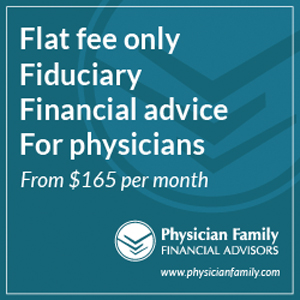(Are you interested in learning about real estate investing or becoming financially free? Join me at the Physician Freedom Summit 2025, October 6-8, in Los Angeles. I will be speaking on purchasing property with no money down, which is how I started investing in real estate.)
There are many forks in the road of life. Some play a big part in deciding how our life will unfold. The direction taken at many of these branch points exclude other possible options, and some paths taken are irreversible.
These forks have the power to set the tone for the rest of our lives and can have big consequences if navigated poorly. Let’s look at six of these defining moments and the consequences they create if taken improperly.
Deciding to become a physician
This is a big decision that comes with a huge price tag in both time and money. For me it meant adding 13 years of training after I finished high school. For most of us it will come with a large student loan debt. I made a great effort to keep my student debt low through a combination of scholarships, which included a Naval Scholarship, good summer jobs, and part time work during college and medical school. Consequently, my student loan debt peaked at $18,000. I began paying this off during residency and started my practice with about $6,000 of remaining student debt.
Becoming a physician means taking on a life that comes with a call schedule. Because of this, we must work hard to keep our home life viable because our job can take over our whole life if we let it.
Although I was never sorry I chose to become a physician, I have often wondered what my life would be like today if I took a different path. The other main options I faced were becoming a professional musician or a computer programmer. I will never know what might have happened if I had chosen one of those options.
Getting married
This is a monumental defining moment. Choosing the person who will be joining us on our adventures for the rest of our life is a daunting task. I suggest taking this one slowly and doing a lot of soul searching before jumping in.
My wife and I took a pre-marital class that was required for anyone getting married in our church. That class forced us to talk about the issues that will come up and cause tension in our relationship. Everyone in the class learned a lot about our future spouse. The depth of communication with our future spouse during this course caused fifty percent of the couples in our class to either cancel or postpone their weddings. I suspect there would have been a very high failure rate in those marriages if they had married without discussing many of the major areas of disagreement in marriages.
Often, we gloss over the tough questions, not wanting to rock the boat. Take the time to ask each other many questions about expectations in marriage. After the wedding is not the right time to start having those discussions.
Before committing to marriage find a premarital group, pastor or mentor who can guide you and your spouse through discussions on debt, lifestyle, kids, dividing household chores, and many other issues that will come up. Every couple must be on the same page on these issues before saying “I do.”
Buying a house
The decision of how much money to spend on the purchase of a house has the potential to hurt your finances for the rest of your life, if you spend too much on that dream house.
I think the concept of “dream house” gets a lot of families in financial trouble. This is the single largest expense in one’s monthly budget, so it has the most potential to damage the budget. The other concept to avoid is thinking of the house as an “investment.” House expenses never show up in the investment section of any budget form.
Physicians get into a mode of thinking about their image. They feel like they need a house fitting for a physician. Whatever that means. Instead, think of finding a house that fits your family and your budget. Nobody needs to live in an 8,000 square foot house. The extra work and expense that comes with a larger house is seldom met with a corresponding extra joy from living in a big house.
Those who make the mistake of spending too much money on a house have a very hard time downsizing after they realize their error. Once you become used to your big house, no other house looks good or feels right. Start smaller and set yourself up for financial success. If you become house-poor, you will not likely have enough money for other things in life like proper insurance, nice vacations and a secure retirement. These are often the people who say things like, “I was not able to start saving for retirement until I was in my 50s.”
Having a child
Most couples do decide to have children. The big question for physicians is when to start. Adding the complexity and time requirements of children during the training years is very difficult. For me, before the era of work hour restrictions, I worked 110 hours a week. A schedule like that doesn’t leave much room for your family after adding time to sleep.
If we put off having kids until we are attendings, then we might also delay enough to get our practice established. But as women age, fertility rates drop, and the rate of DNA anomalies goes up.
The fertility issue can become a huge expense as fertility treatments are very expensive and time consuming. So having kids early has problems and opting for later also has problems. There is no great time to add children to your family. If you want kids, make sure you have a discussion on timing before you get married.
We decided to wait two years after our wedding to allow us time to get to know each other well as a couple before adding another layer of complexity with children. We married during my first year of residency and had our first child during my fourth year of residency and the second child two years later.
Becoming debt free
This is another life altering decision. Americans love borrowing money to get the things they want sooner. Over 80% of new cars are financed. Some people feel they should never pay off their house because it is “good debt.” More than half of Americans carry a balance on their credit cards.
Americans have an unhealthy relationship with debt. Debtabetic Neuropathy is especially bad for physicians, which I discussed in my book, The Doctors Guide to Eliminating Debt.
I do not buy into the concept of any debt being considered good debt. All debt is a burden, and it is a burden we can opt out of.
About three years into my practice, we found ourselves about half a million dollars in debt. We decided to stop borrowing money to buy things, start saving money before making purchases, and become debt free. It took us about six years to achieve that goal. After becoming debt free, we did invest in our cash flowing real estate properties with mortgages, and we are still carrying some debt on them. The nice thing about this debt is we are not responsible for paying the debt, the tenants are. That debt never shows up in our personal budget.
Becoming debt free was a life altering moment for us. Without debt, I had the courage to stop doing things in medicine that I didn’t like. I stopped seeing certain diagnoses and my life, and my job as a surgeon, greatly improved. It also skyrocketed our savings accounts as all the money that used to go to servicing debt and accelerating the debt payoff was now going into investment accounts.
Financial independence
Reaching the point where we become financially independent, where our investments make more money than we spend, is very freeing. Once this happens, work becomes optional.
When we reached this point, I was free to cut back to half-time and spend more time at home with my family. Since we no longer needed to invest money in our retirement savings account, we were able to redirect that money to a nicer lifestyle and giving more money to our favorite charities.
Financial independence creates a new freedom that is hard to imagine until you experience it for yourself. People at every income level should be striving to become financially independent.
There are other moments in life that can create a great shift in our lives, but I think these six are the big ones. Give each of them some thought before setting sail and you will have a great life not complicated by decisions you wish you had made differently.






specific to medicine. 1) acceptance to med school 2) first day as a medical student 3) match day 3a) med school graduation 4) first day as a resident physician 5) finishing residency/’graduation”
ds
Six no brainers for sure. If after deciding to become a physician, you have not considered the other five you may be in for many life altering situations.
Cory, I love this post as it encapsulates so many of the major “mile-marker decisions” in our medical lives. Of these 6 you mention, I think “who you choose to marry” is the most heavily weighted of these decisions, as it likely influences all of the other decisions.
ZERO debate on that choice. It is WITHOUT QUESTION, THE most important decision you can (and likely will) make: BUT, that is AFTER you answer the mandatory preliminary question: WILL you marry? Not all are best served by marriage. An error in either case will negatively affect the entirety of the rest of your life.